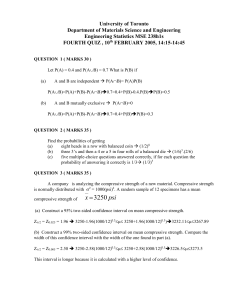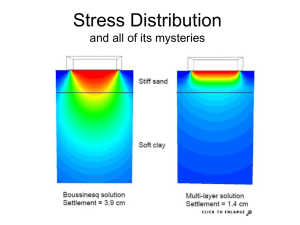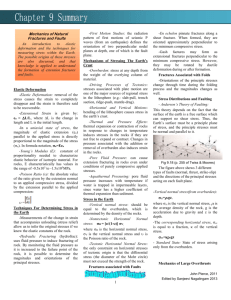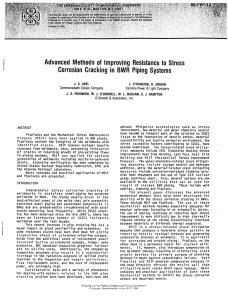New Mechanical and Thermal Processes for Mitigating Stress-Corrosion and Corrosion-Accelerated Fatigue
advertisement
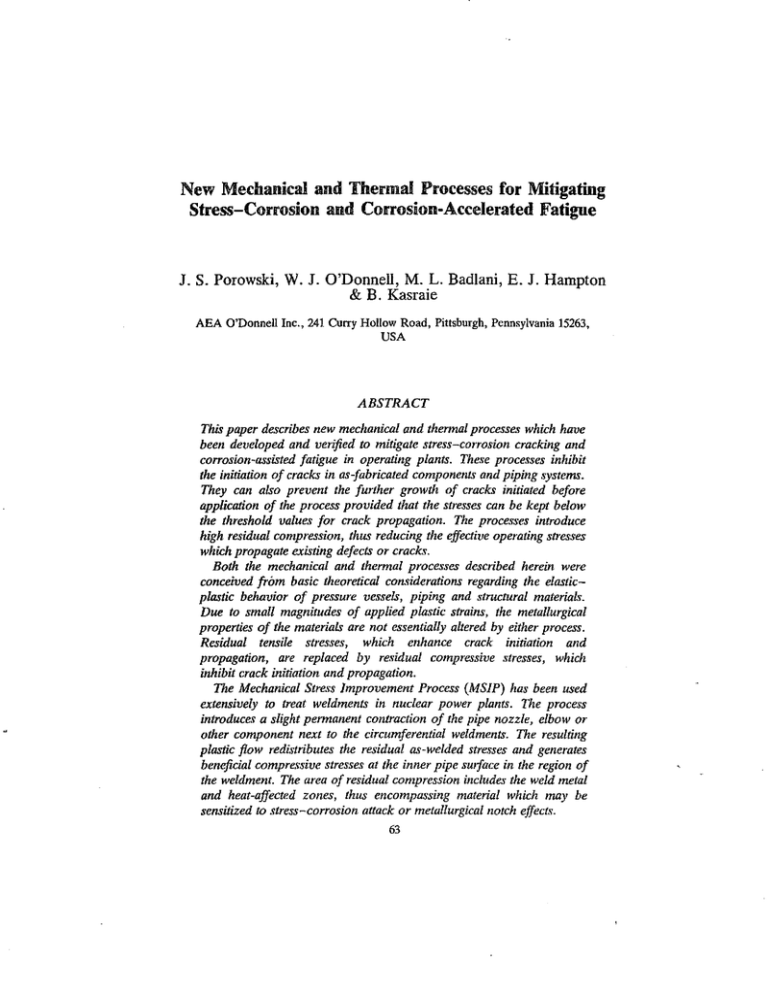
New Mechanical and Thermal Processes for Mitigating Stress-Corrosion and Corrosion-Accelerated Fatigue J. S. Porowski, W. J. O'Donnell, M. L. Badlani, E. J. Hampton & B. Kasraie AEA O'Donnell Inc., 241 Curry Hollow Road, Pittsburgh, Pennsylvania 15263, USA ABSTRACT This paper describes new mechanical and thermal processes which have been developed and verified to mitigate stress-corrosion cracking and corrosion-assisted fatigue in operating plants. These processes inhibit the initiation of cracks in as fabricated components and piping systems. They can also prevent the further growth of cracks initiated before application of the process provided that the stresses can be kept below the threshold values for crack propagation. The processes introduce high residual compression, thus reducing the effective operating stresses which propagate existing defects or cracks. Both the mechanical and thermal processes described herein were conceived from basic theoretical considerations regarding the elastic-plastic behavior of pressure vessels, piping and structural materials. Due to small magnitudes of applied plastic strains, the metallurgical properties of the materials are not essentially altered by either process. Residual tensile stresses, which enhance crack initiation and propagation, are replaced by residual compressive stresses, which inhibit crack initiation and propagation. The Mechanical Stress Improvement Process (MSIP) has been used extensively to treat weldments in nuclear power plants. The process introduces a slight permanent contraction of the pipe nozzle, elbow or other component next to the circumferential weldments. The resulting plastic flow redistributes the residual as-welded stresses and generates beneficial compressive stresses at the inner pipe surface in the region of the weldment. The area of residual compression includes the weld metal and heat-affected zones, thus encompassing material which may be sensitized to stress-corrosion attack or metallurgical notch effects. 63 64 I. S. Porowski et al. MSIP introduces compressive stresses at weldments by mechanical means via a hydraulically actuated mechanical clamp used to contract the shell on one side of the weldment. The shell is squeezed by the tool in the near vicinity of the circumferential weldment but not at the weld itself Contraction of the shell and the position and width of the tool are such that the plastic zone which is developed during application of the process extends throughout the weldment region. Compatibility of the deformation along the shell creates an axial profile which at the inner surface of the weldment has a concave curvature. The negative axial curvature and corresponding reduction of the pipe radius result in the generation of residual compressive stresses at the inner pipe surface in both the axial and hoop directions, respectively. This is quite beneficial where the coolant is corrosive and subjected to thermal transients. MSIP imposes only monotonic compressive plastic strains, and therefore does not propagate existing cracks. The process has been applied to plants with many years of prior service, including critical safety Class 1 weldments in nuclear plants known to contain existing cracks. Reinspection after a year of operation confirmed that the cracks did not grow. Variations in actual as fabricated weldment strength due to variations in welding processes and parameters are known to be quite substantial. However, the tool design includes the use of spacers and shims which limit the maximum contraction, and the process is displacementcontrolled. This makes it possible to set the process parameters to include wide variations in material strength, while achieving consistent results. The results of finite element analyses are presented for various geometries including applications near thermal sleeves, and transition weldments which include three or more materials. The Thermal Surface Improvement Process (TSIP) is applicable to virtually any size and shape of mechanical element, from pressure vessels to machine parts and turbine blades. The mechanical elements being treated are heated to an elevated temperature, and then the surface is rapidly cooled, such that the transient thermal stresses exceed the flow strength of the material in biaxial tension. This cooling is usually accomplished by short time, intensive spray quenching. When the entire mechanical part returns to uniform temperature, high residual compressive stresses are introduced at the surface of the part. The thickness of the surface layer which is in residual compression can be made substantially greater than the compressive layers that can be introduced by shot peening or other processes, and the mechanical integrity of the surface material is not disturbed. The applicability of the process is more limited for very high strength materials where higher temperatures are needed to achieve yielding during the quench phase. However, the elevated temperature must be limited to prevent undesirable metallurgical changes. Stress-corrosion and corrosion-assisted fatigue mitigation 65 INTRODUCTION Reduction of tensile stress moderates the advance of stress-corrosion attack. The present paper discusses two methods of preventing stresscorrosion by generating compressive stresses in component surface layers exposed to aggressive environments. The Mechanical Stress Improvement Process (MSIP) has been developed and implemented to protect piping systems of Boiling Water Nuclear Reactors. The process reverses the tensile stress patterns generated by welding. High axial and hoop tension in the root section of the weld is replaced by compression. The compressive layer extends deep into the thickness of the pipe. Cracks up to 50% thru-wall become arrested. The Thermal Surface Improvement Process (TSIP) developed to improve stress-corrosion and fatigue resistance of turbine discs and control rod guide tube split pins in nuclear reactors involves thermal surface treatment. After heating the element to about 538 °C (1000 °F), the element is quenched by water and then allowed to reach a uniform temperature. Surface temperature gradients due to quench cooling are sufficient to generate plastic strains at the surface. The resulting compressive stresses seal the surface to mitigate stress-corrosion. The negative mean stress also improves fatigue resistance. The process parameters are selected to ensure the desired depth of the surface compression layer and the magnitude of the surface compressive stress. The process, developed for turbine discs and reactor split pins, is also applicable for other components including turbine disk blades, tubes, pump shafts and other machine elements. MSIP is intended for generation of deep compressive layers. TSIP provides a uniform layer of compressive stress which, depending on component geometry, may extend from a few mils to a larger depth of a few hundred mils. The analysis of the processes involves inelastic finite element solutions which can be obtained for the entire history of loading using commonly available super mini-computers. Test results confirmed that such analyses can be effectively used to yield accurate prediction of actual stress magnitudes. MECHANICAL STRESS IMPROVEMENT PROCESS (MSIP) Background of the process The complex interaction of tensile stress, material sensitivity and environment, the three factors contributing to intergranular stress-

